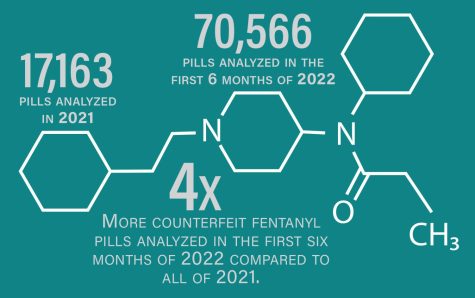“Just like a nightmare:” Fentanyl’s damages to Iowa communities
Devin Anderson, 23, died of an accidental overdose in February. He’s one of many Iowans who have died from the highly potent opiate in the shape of counterfeit prescription medication, which is gaining popularity in the illegal market.
Pictured Left to Right: Drake Anderson, Brooke Anderson, Devin Anderson, and Drew Anderson. Courtesy of Brooke Anderson.
October 25, 2022
Devin Anderson was a football player and the captain of the soccer team at Avoca, Hancock, Shelby, Tennant, and Walnut High School in the small town of Avoca, Iowa.
He grew up in the western-Iowa town with a population of 1,300 with his mother Brooke Anderson and his two younger brothers — Drew, 13 , and Drake, 14. Devin was a good student and kid, Brooke said.
“He was just one of those kids that when he walked in the room, he just lit up the room and always made everybody laugh,” Brooke said. “He was the life of the party … He was just a real funny kid.”
Devin worked for most of his life and had a full-time job since he was 16. When he suddenly quit his job at 22 and remained unemployed for 10 months in 2020 — no fault to the pandemic — his mother was concerned. Brooke said he had plenty of savings and could live off the large sum he set aside while he was unemployed.
Eventually, Brooke noticed her once muscular and fit son was now slim. His bones were prominent, and he began to look paler. Brooke eventually learned from Devin in April 2021 that he was using pills and developing an addiction.
To help him through recovery, Brooke insisted Devin move back in with her. He obliged and sought help. He started seeing a psychiatrist, returned to his job, and Brooke said he appeared happier.
But on Feb. 24, Brooke’s world crumbled when Devin accidentally overdosed on the potent opioid fentanyl after taking what he thought was a prescription medication.
Devin had taken a M30 pill, a common counterfeit pill that mimics the opioid painkiller oxycodone and the controlled anti-anxiety medication Xanax. M30 pills contain pure fentanyl and pill binders and are often known as “Rainbow Fentanyl,” a term popularized by the Drug Enforcement Administration which had called for more measures on border security from President Joe Biden.
Brooke had taken her youngest son, Drew, to his wrestling workout 20 minutes away from their Avoka duplex in the early morning hours. Devin’s co-worker arrived at their home and noticed Devin wasn’t ready. He texted and called Devin to see if he was awake, and even had Devin’s boss call and try to wake him.
Eventually, after a flurry of phone calls and texts, Devin’s brother, Drake, heard Devin’s phone vibrating in his room and went to investigate. Drake found Devin in his bed, lifeless. Unsure what to do, he went to the front door where Devin’s co-worker told him to call for help. Brooke received a call from Devin’s boss breaking the news and telling her to get home as soon as possible.
“I don’t know what’s going on, but I don’t think Devin’s alive,” Brooke said, recalling her reaction at the time. “We’re going to get there, and he might not be alive, and so I didn’t know what was going on.”
Devin was pronounced dead at the scene. An investigation found Devin likely passed the night before when he went to bed.
“And that’s what’s happening to a lot of kids: if they’re not with a friend, they’re alone in the room. If their door’s shut, they die — they just die in their sleep,” Brooke said. “And the next morning, their parents find them.”
Counterfeit prescription drug problem growing in Iowa

Infographic by Marandah Mangra-Dutcher
Devin is among a growing number of Iowans who are dying due to the influx of fentanyl in the state. With a growing number of counterfeit pills entering Iowa, officials are concerned about the threat it poses.
Democrats and Republicans agree the influx of counterfeit pills is a danger to Iowans. Many Republicans, however have taken the chance to make the issue partisan, calling on the Biden administration to remedy the crisis and the situation at the U.S. Southern Border.
Democrats are looking to solve underlying issues of the crisis by pushing for education and immigration reform. Meanwhile, Republicans are looking to increase criminal penalties for the distribution of such drugs and reschedule it as a Schedule 1 drug, increasing the regulatory authority of the Food and Drug Administration and the U.S. Justice Department.
The Iowa Division of Criminal Investigation analyzed 17,163 counterfeit prescription pills containing fentanyl in 2021, according to a news release from Iowa Gov. Kim Reynolds’ office. In the first six months of 2022, Iowa DCI analyzed 70,566 pills, almost four times the amount in 2021.
The pills are often disguised as prescription medication but can contain lethal amounts of fentanyl. According to the DEA, 2-3 milligrams of fentanyl can be deadly, and 42 percent of counterfeit pills contain a lethal dose.
According to the Iowa Department of Public Health, drug overdose deaths have risen 34 percent from 2019 to 2021 and now total 470. Fentanyl accounted for 83 percent of opioid deaths in Iowa last year. Overdose deaths in young Iowans under 25 increased by 120 percent over the last two years.
Experts recommend targeted prevention, harm reduction
A study by the National Institute on Drug Abuse found the number of laced fentanyl pills entering the U.S. increased 50-fold from 2018 to the last quarter of 2021 — where about 2 million fentanyl-laced pills were seized in the last quarter of 2021 nationwide.
Joseph Palamar, an associate professor of population health at the New York University Grossman School of Medicine and a researcher with the Center for Drug Use and HIV/HCV research at the NYU school of Global Public Health, authored the study.
He said people taking prescription medication without a prescription think it is safer than illicit drug use. However, with counterfeit pills surging in the U.S., it can be deadly if someone takes a fentanyl-laced pill.
“Fentanyl-related deaths are continuing to increase in the United States, and there is a critical need for more real time data — especially regarding drug supply — to help with targeted prevention and harm reduction efforts,” Palamar wrote in the study published in the Journal of Drug and Alcohol Dependence.
Experts warn those who use illicit drugs or non-prescribed medication should carry fentanyl test strips, which are still considered illegal drug paraphernalia in Iowa. They also recommend Naloxone — which can be bought in Iowa at any pharmacy without a prescription or at harm reduction centers.
What are Iowa politicians doing about it?
Republican lawmakers and officials have criticized the Biden administration for failing to take care of this crisis, blaming the number of migrants in the U.S.-Mexico border for an influx of drug activity in the U.S.
Reynolds criticized the Biden administration for not handling the increased number of migrants at the border and the rise in illegal drug trafficking.
“Fentanyl is here, and the threat is real — in our major metro areas and in our small towns — no community is immune,” Reynolds said in a news release.
U.S. Rep. Ashley Hinson, R-Iowa, said on Fox News’ “Mornings with Maria” on Sept. 19 Biden needs to do more.
“This is a humanitarian crisis that they continue to turn a blind eye to. It is the migrants that are dying on the way to this country, the cartels that continue to profit off of that illicit fentanyl and meth that’s making its way into our backyards,” Hinson said.
Some officials are doing more than taking a critical stance on the Biden administration’s handling of the border.
Sen. Chuck Grassley, R-Iowa, advocated for the permanent scheduling of fentanyl to aid the U.S. Justice Department and the DEA in combating the spread of counterfeit pills and the distribution of fentanyl.
“While Congress has been waiting to take action, the cartels have not,” Grassley said during his floor speech on Sept. 21. “The cartels have simply rebranded fentanyl like candy to addict America’s children.”
Sen. Joni Ernst, R-Iowa, introduced the Felony Murder for Deadly Fentanyl Distribution Act that would make the distribution of fentanyl resulting in death punishable by federal felony charges.
“A wide-open southern border has fueled a fentanyl epidemic in this country. The dealers and distributors of this deadly drug must be held accountable, and that’s what we’re fighting to do,” Ernst said in a press release.
Liz Mathis, the Democratic candidate in Iowa’s 2nd Congressional District, also voiced criticism for the large amount of migrants entering the country and the surge of counterfeit pills during her debate against the republican incumbent Hinson.
“I think the Biden administration has failed at the border,” Mathis said. “When we look at pictures, it looks like chaos. And so, I believe that we need to hire more border patrol. We certainly, you know, strengthen their help on the border, and we certainly need to address the technology issue.”
Iowa Attorney General Tom Miller, a Democrat, has advocated for Iowans affected by the opioid epidemic caused by pharmaceutical companies which marketed painkillers while downplaying the chances for addiction.
According to a news release in September from Miller’s office, they expect Iowa to receive $177.74 million from settlements with opioid maker Johnson & Johnson and the nation’s three major pharmaceutical distributors: Cardinal, McKesson, and AmerisourceBergen.
Miller signed an agreement with University of Iowa Health Care to develop a statewide opioid addiction treatment program with $3.8 million in funds from the settlement.
“Iowa has a huge unmet demand for treatment for people suffering from opioid use disorder,” Miller said in a press release.
Miller also launched IowaOpioidHelp.com to inform Iowans on addiction and addiction, treatment, and resources near them.
‘Like a nightmare’
After the investigation that followed Devin’s death, five people from Cass County, Iowa, were federally indicted in June and charged with conspiracy to distribute fentanyl resulting in the death of several western Iowa residents, including Devin.
U.S. Attorney Richard Westphal of the Southern District of Iowa wrote in a news release that the drug distribution network spans eastern Nebraska and western Iowa.
According to court documents, 19-year-old Mason Blaine Loudermilk of Atlantic, Iowa; 28-year-old Chase Daniel Jahnke of Lewis, Iowa; 26-year-old Kelsi Marie Thurman of Lewis, Iowa; 25-year-old Colby Ray Clarken of Atlantic, Iowa; and 19-year-old Collin Jacob Clarken of Atlantic, Iowa appeared in court on June 24.
Records show Thurman admitted Clarken supplied fentanyl pills to an individual who overdosed on Feb. 24, the same day as Devin’s overdose.
Loudermilk entered a guilty plea to conspiracy to distribute fentanyl last month. His sentencing is currently scheduled for Feb. 28, 2023.
The charges carry a mandatory minimum sentence of at least 20 years in prison and a maximum of life in prison. The charges they face also carry a maximum fine of $20 million and supervised release of at least 10 years.
A trial for Colby Ray Clarken and Collin Jacob Clarken is set for Jan. 30, 2023.
Chase Jahnke pleaded guilty on Oct. 21 and will have a sentencing hearing on March 28, 2023.
Thurman has entered a guilty plea and is awaiting sentencing.
Devin would have turned 24 years old on June 21.
Brooke decided to give Devin’s death a purpose. In the coming months, Brooke will educate southwest Iowa schools on the dangers of fentanyl in Devin’s memory.
“It’s coming up on the holidays. It’s going to be very hard for the first time not to have him here with us,” Brooke said. “He was just very loved, and I still can’t even believe he’s not here. Every day I wake up, and it’s just like a nightmare.”















